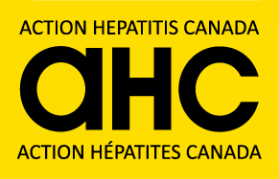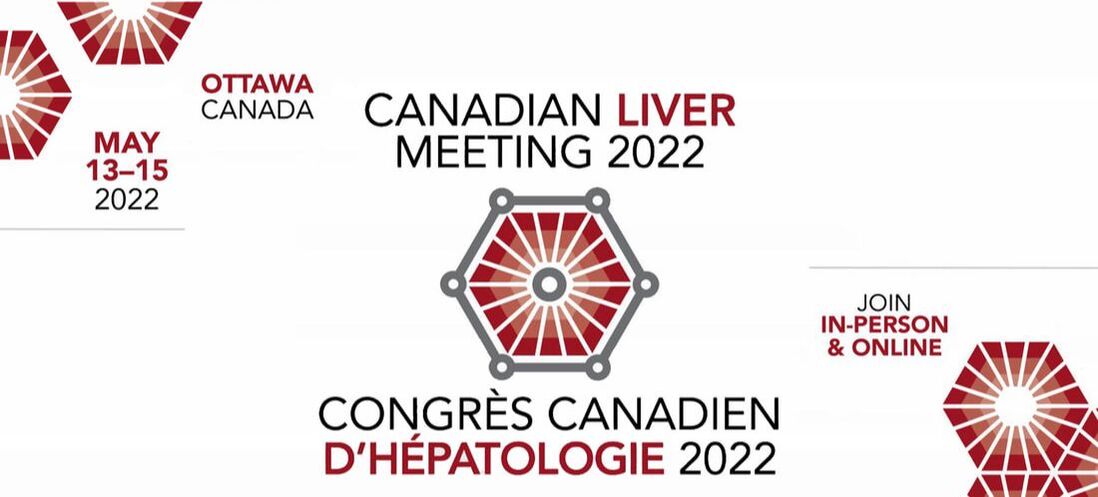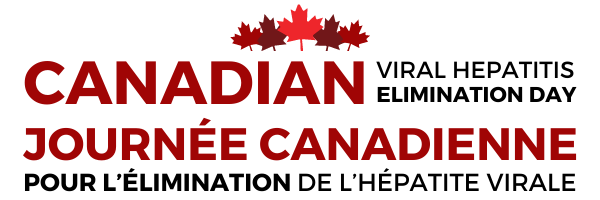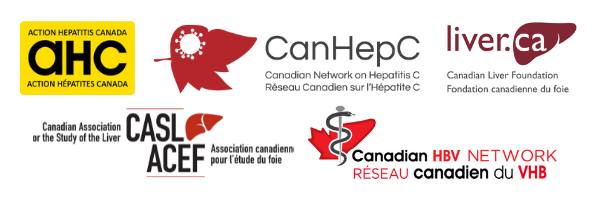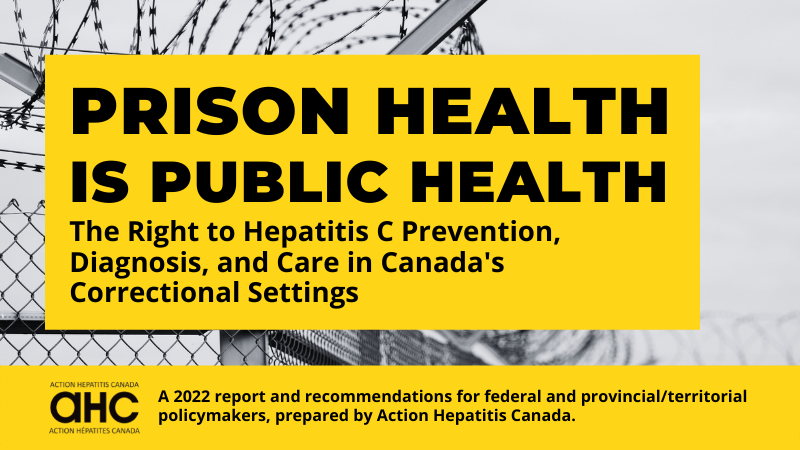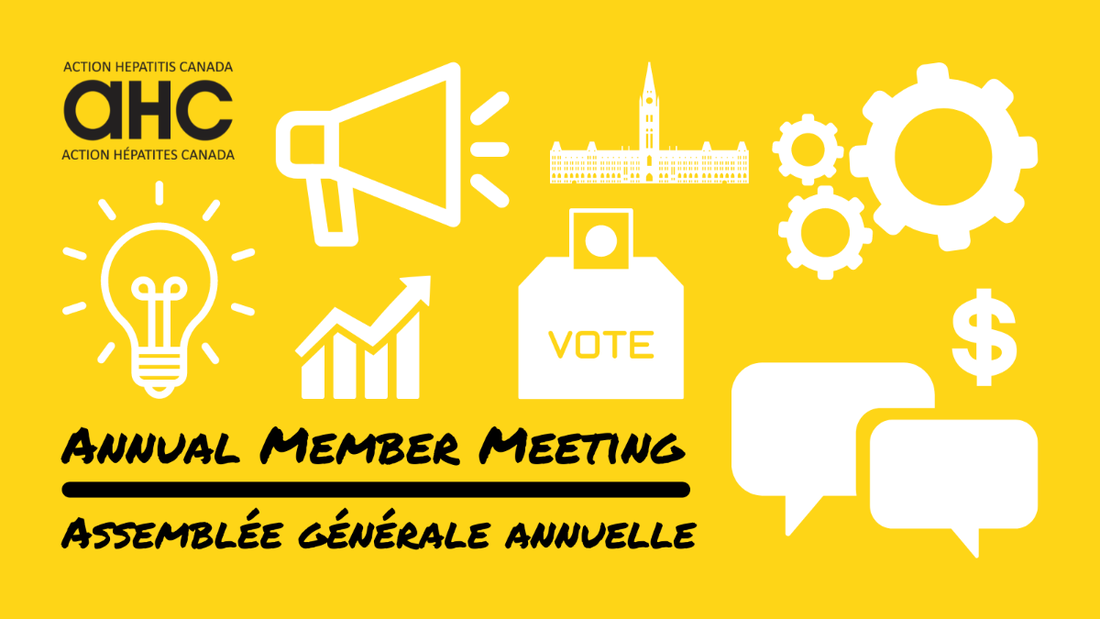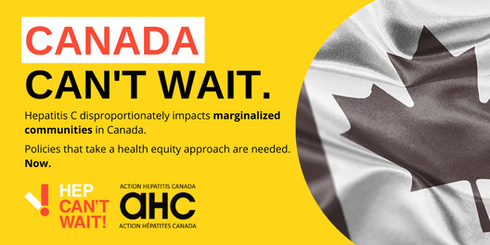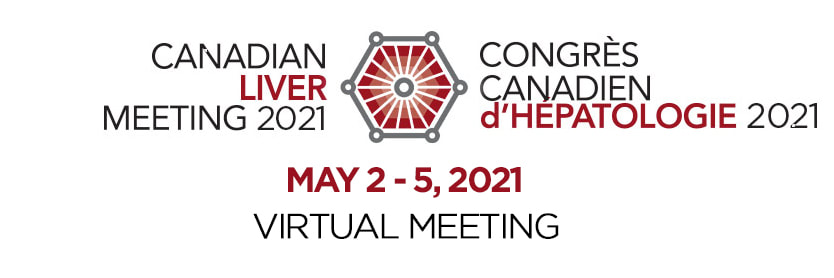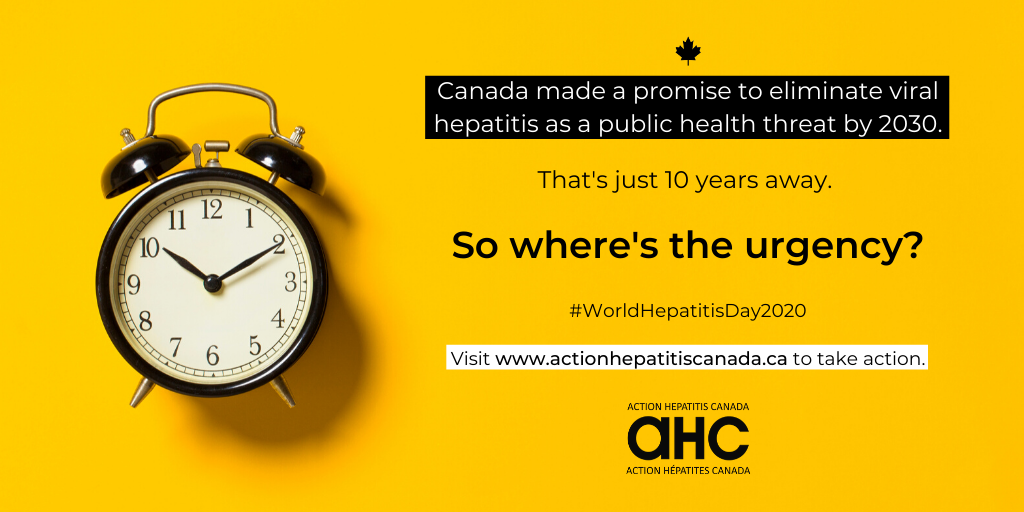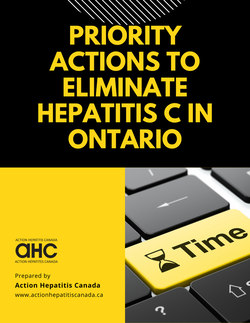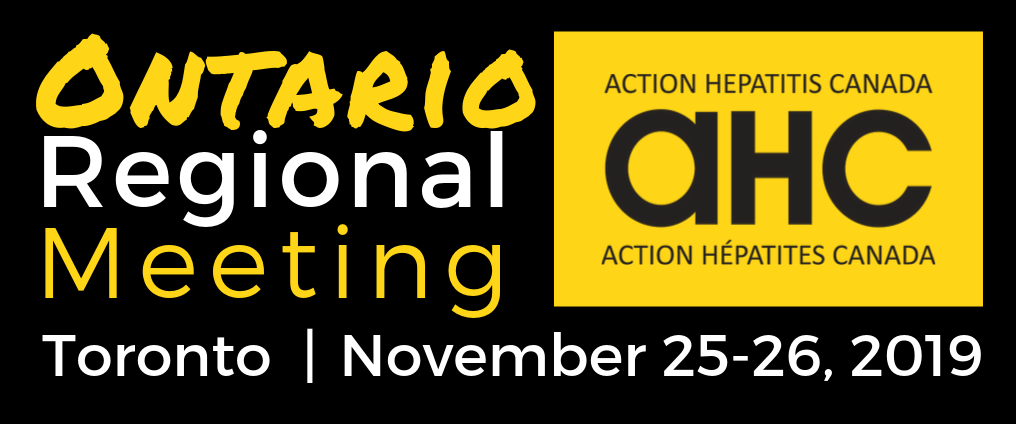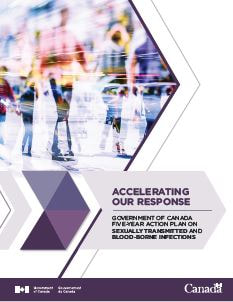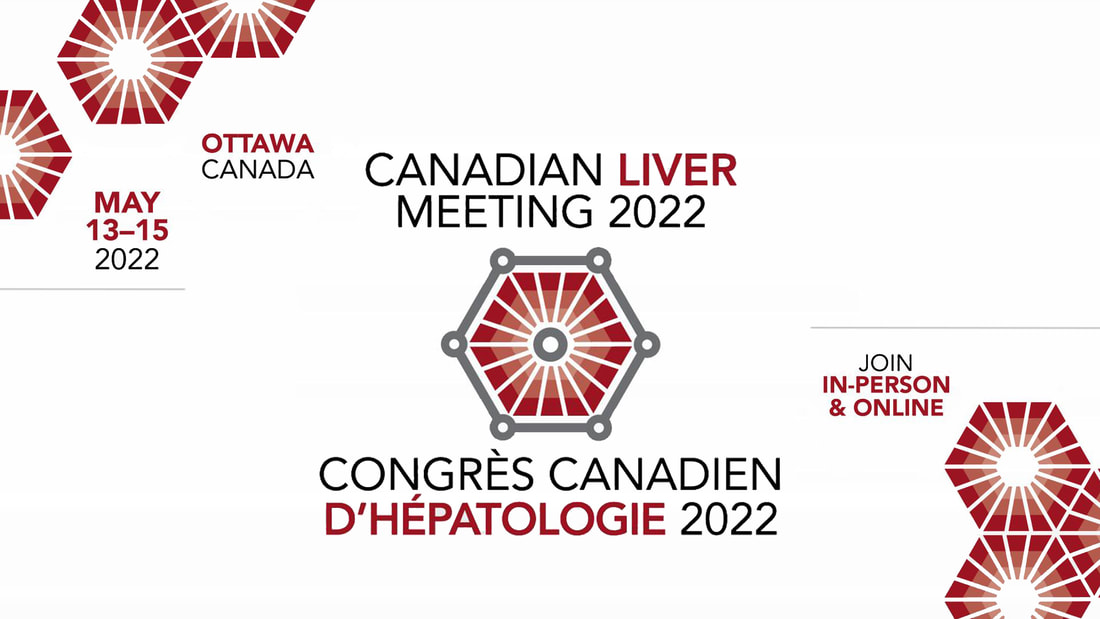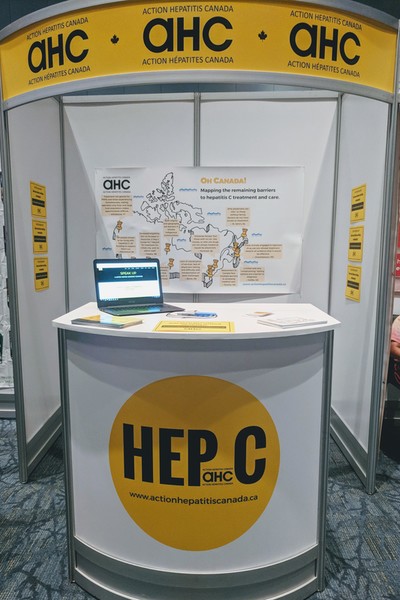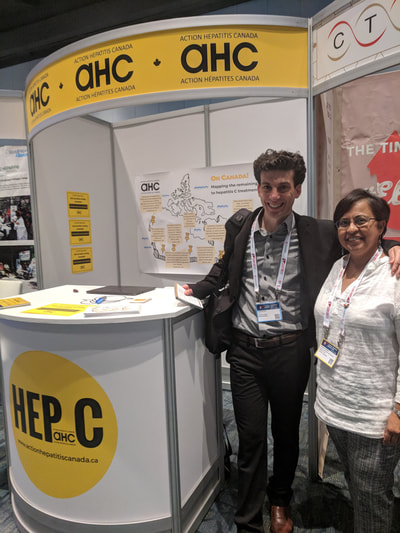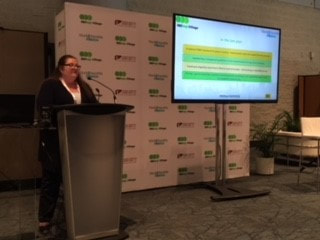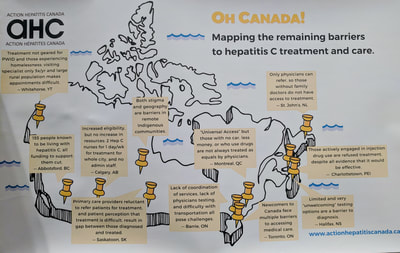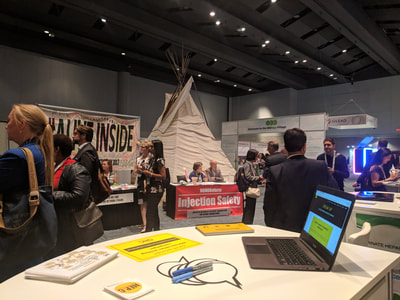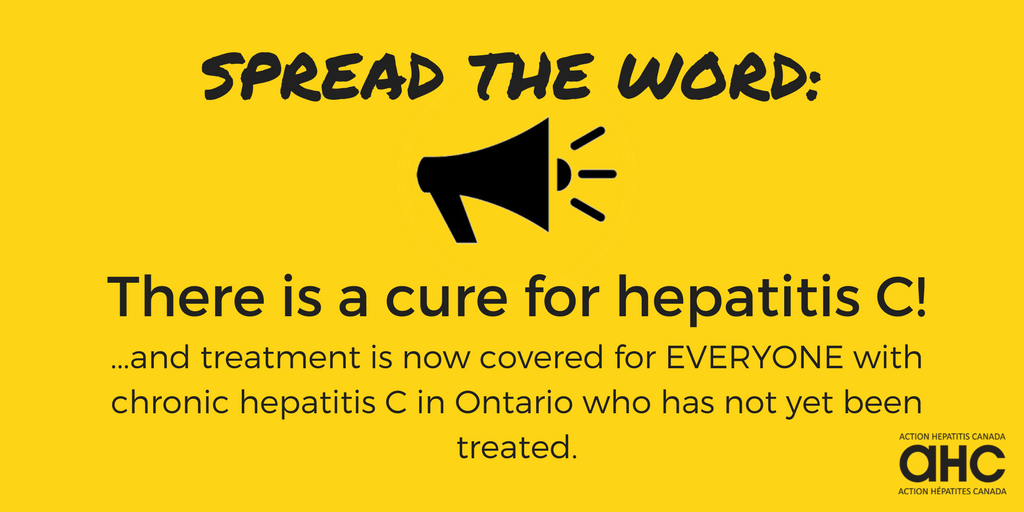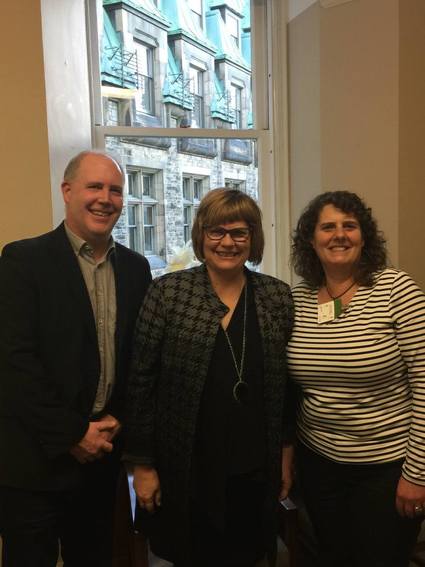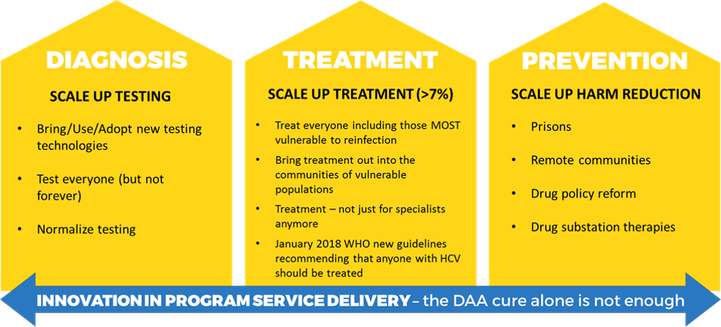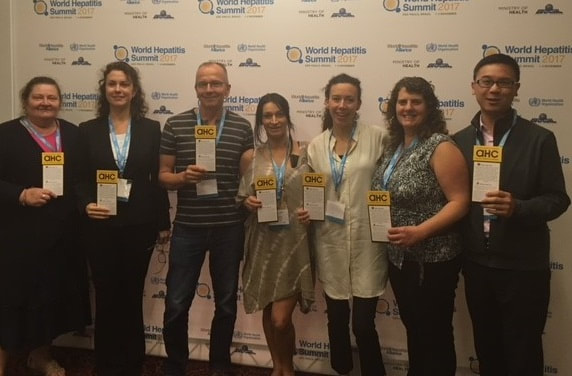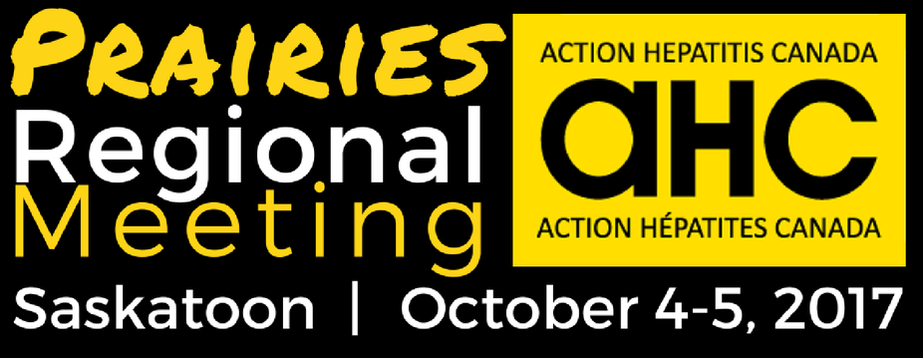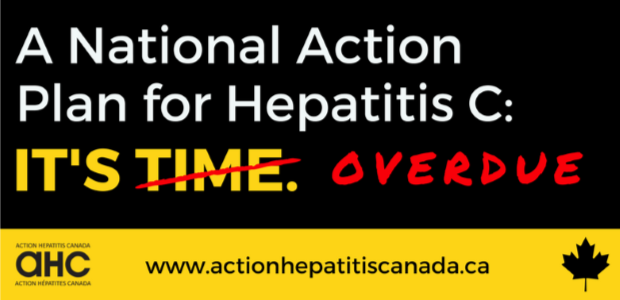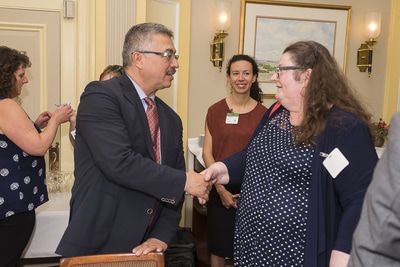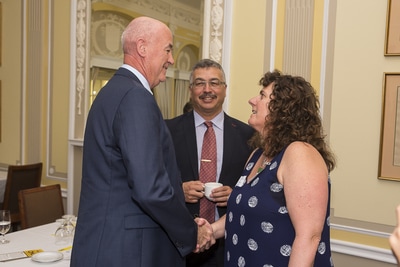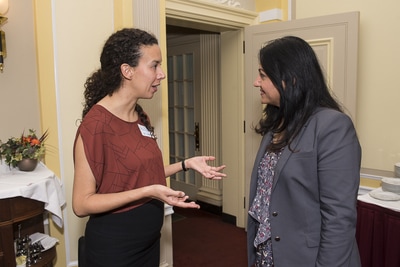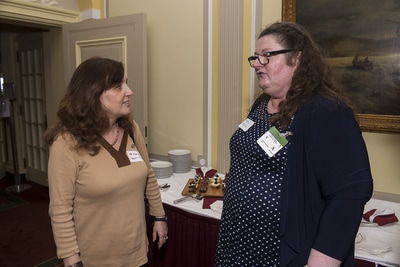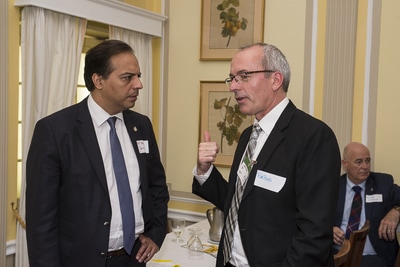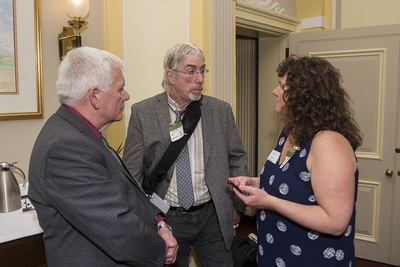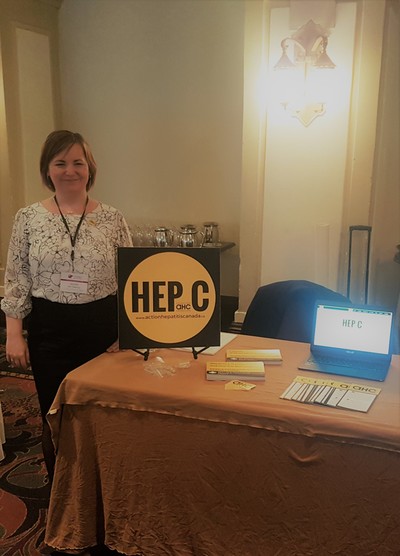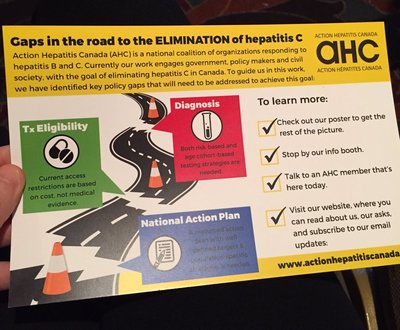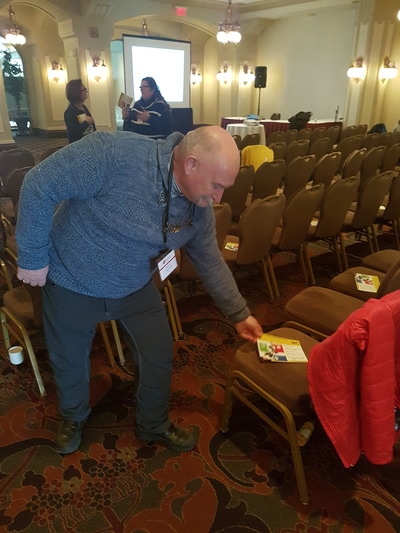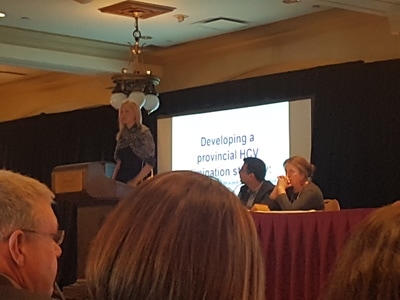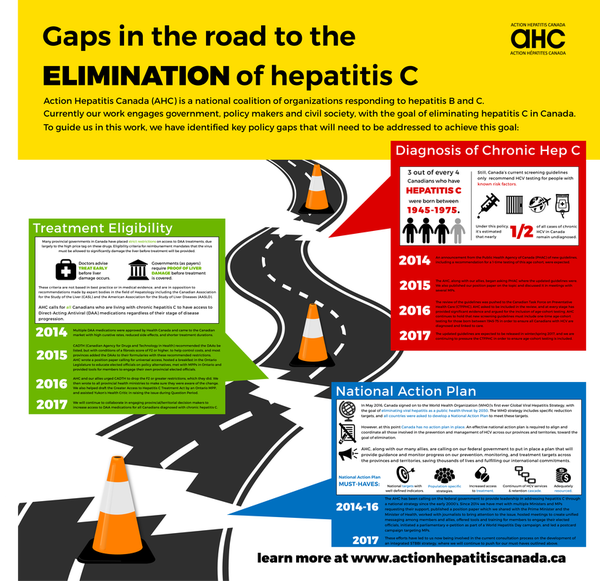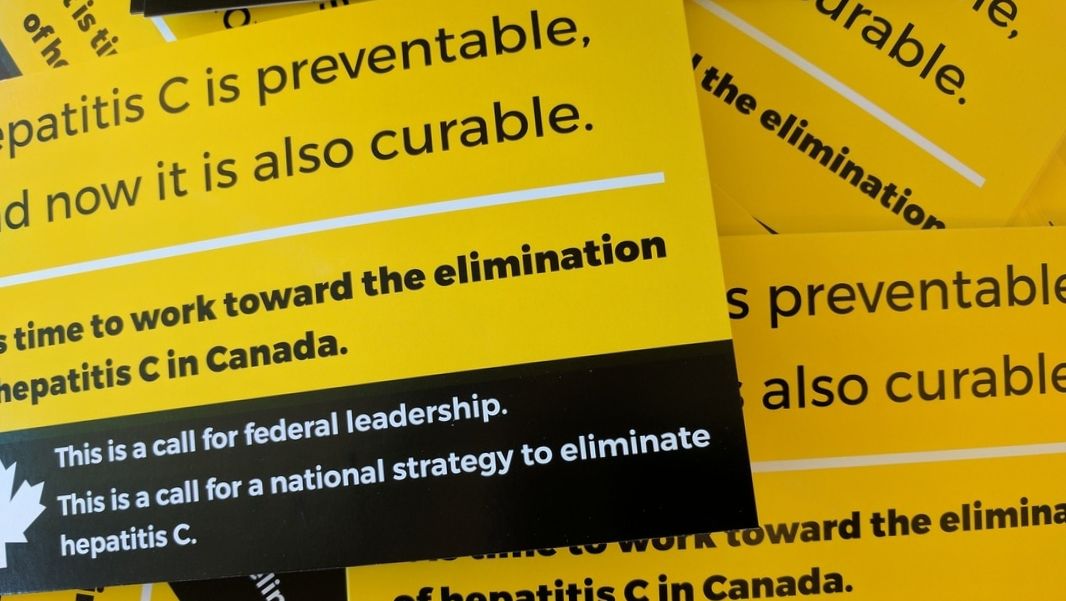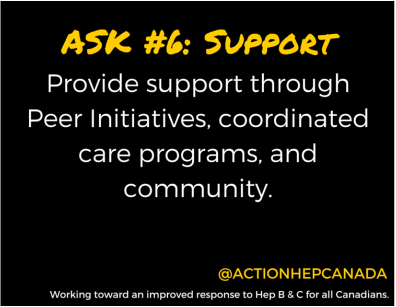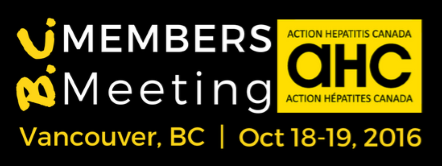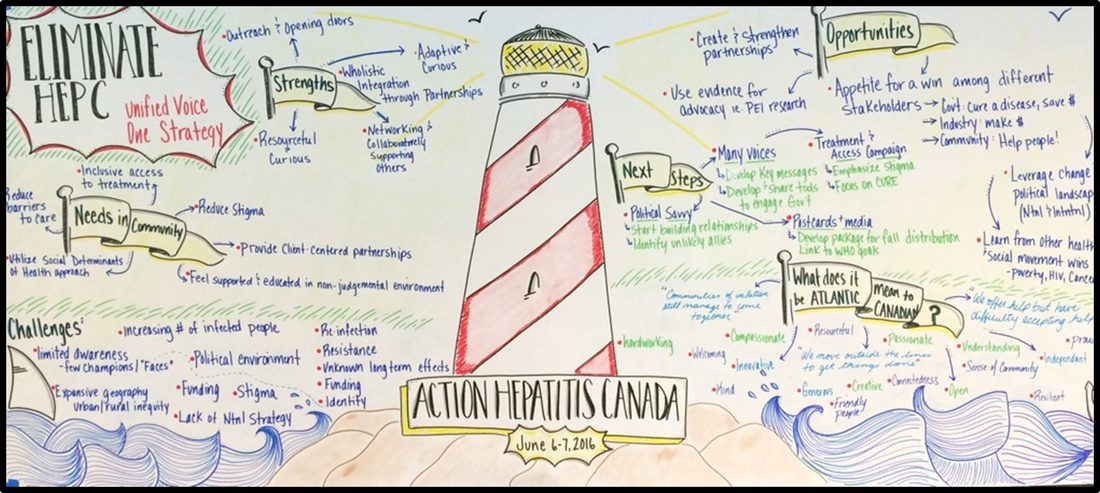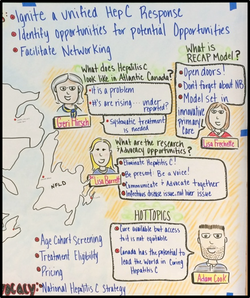AHC Atlantic Members Meeting in Halifax, November 2-3, 2022September 21, 2022
On November 2-3, 2023, AHC members from the four Atlantic provinces and AHC Steering Committee members will gather in Halifax, NS.
We’ll be (re)igniting a unified viral hepatitis elimination advocacy response among AHC Atlantic region membership, identifying opportunities for potential collaboration and strategic action in our advocacy moving forward, and strengthening our networks with like-minded advocates. The Steering Committee will also meet for a day in Halifax to plan for 2023. AHC @ the Canadian Liver MeetingMay 13, 2022
Action Hepatitis Canada is at the Canadian Liver Meeting 2022 We are happy to be back as a community partner for this important set of meetings. Stop by our booth to get a copy of our Prison Health is Public Health Report, and fun buttons and stickers.
Beyond AHC's involvement, there are over 2 days of programming with speakers from around the world on many topics that will be of interest to those of us working in community. We hope to see you here! Announcing the first Canadian Viral Hepatitis Elimination Day: May 11April 21, 2022
On Wednesday, May 11, 2022, Action Hepatitis Canada will be joined by CanHepC, CanHepB, the Canadian Liver Foundation, and the Canadian Association for the Study of the Liver to mark the inaugural Canadian Viral Hepatitis Elimination Day in Ottawa.
We’ll mark the day with a press conference on Parliament Hill and a Parliamentary Reception. We also have a number of meetings booked throughout the day with key policy makers.
By taking part in Canadian Viral Hepatitis Elimination Day, you can amplify our call for the federal government and each province and territory to bring urgency to eliminating viral hepatitis as a public health threat by 2030. Prison Health is Public Health Report launchedMarch 31, 2022
This new report was a collaborative effort involving several AHC member organizations, people with lived experience, and allied physicians and researchers. We're proud of the recommendations laid out in this report for both federal and provincial/territorial governments.
Read the Report here. Join us for a webinar about the Report, and using it as an advocacy tool with policymakers, on Tuesday, April 12 at 12:30pm ET. Register here. Letter Requesting Evidence-Based Viral Hepatitis Screening GuidelinesFebruary 22, 2022
On January 24, AHC, along with CanHepC, CanHepB, the Canadian Liver Foundation, and 26 other signing organizations, sent a letter to the Canadian Task Force for Preventive Health Care (CTFPHC) requesting a review of their 2017 HCV screening guidelines and pointing out the need for HBV screening guidelines in Canada.
We have received a brief response from Dr. Roland Grad, co-chair of the CTFPHC, thanking us for the reminder to prioritize HCV guidelines for updating, and suggesting that we submit HBV screening for adults through their online suggestion box, which we have done. If you would also like to submit a request for HBV screening for adults, you can do so here. Notice to Members: Annual Member Meeting February 15, 2022January 12, 2022
Please join us to review the successes and learnings of 2021, and hear about our plans for 2022. This is a great chance to get connected, ask questions, and let us know how we can best support you in your hepatitis advocacy work. See newsletter for registration link.
Call for Nominations to the AHC Steering Committee: If you would like to put forward your organization as a nominee for the Steering Committee, please do so via email to [email protected] no later than February 1st.
AHC Steering Committee Meeting in Toronto for 2022 Strategic PlanningOctober 25, 2021
On November 16-17, 2021, the AHC Steering Committee will be gathering in Toronto to do some strategic planning for the coming year. If you have any suggestions or things you would like considered as we look forward to our work in 2022, please send us an email as we develop our agenda.
World Hepatitis Day Theme:
|
|
On Wednesday, July 17, the Honourable Ginette Petitpas Taylor, federal Minister of Health, spoke at the STI & HIV 2019 World Congress in Vancouver and launched the Government of Canada's Five-Year Action Plan on Sexually Transmitted and Blood-Borne Infections. This follows the 2018 release of the Pan-Canadian Sexually Transmitted and Blood-Borne Infections Framework for Action.
In a recent meeting with Minister Petitpas Taylor's senior policy advisor on the STBBI file, we were told that "frameworks inform action plans, action plans inform programs, and programs inform budget allocations." |
In this sense, we are pleased to be moving one step closer to actions and investments that will work toward the elimination of viral hepatitis as a public health threat by 2030.
But after more than five years of advocating for a viral hepatitis elimination plan, the arrival of this Action Plan is somewhat anti-climactic.
First, the good.
The Action Plan:
The Minister also announced funding for several initiatives that support the priorities of the Action Plan:
Now, the bad.
The Action Plan:
In short, we have been calling for an implementation plan with four must-haves:
This Action Plan does not provide any of these things; instead, it simply acknowledges that these things are needed.
We will continue to call for federal, provincial, and territorial implementation plans that move from the conceptual to actual actions, targets, and timelines, and that are oriented toward the extraordinary opportunity to eliminate the most burdensome infectious disease in the country.
But after more than five years of advocating for a viral hepatitis elimination plan, the arrival of this Action Plan is somewhat anti-climactic.
First, the good.
The Action Plan:
- Identifies priority areas of: Moving toward truth and reconciliation with First Nations, Inuit and Métis Peoples; Stigma and discrimination; Community innovation; Reaching the undiagnosed; Prevention, treatment and care; Leveraging existing knowledge and targeting future research; Measurement and impact;
- Acknowledges priority populations;
- Acknowledges that "current approaches to STBBI testing are not reaching everyone who could benefit from testing and linkage to care and prevention programs"; and
- Commits the Government of Canada to "playing its role" in the development, regulatory approval, and deployment of point-of-care testing and other new testing technologies that could reach the undiagnosed and facilitate linkage to care.
The Minister also announced funding for several initiatives that support the priorities of the Action Plan:
- $7.7 million for 29 projects over two years through the Public Health Agency of Canada's Harm Reduction Fund;
- $5 million over five years for the Public Health Agency of Canada's National Microbiology Laboratory's newly established Innovative Diagnostics Program; and
- $32.4 million to the Canadian Institutes of Health Research for research grants on HIV/AIDS, hepatitis C and other STBBI.
Now, the bad.
The Action Plan:
- Contains no Canadian targets (the WHO global 2030 targets are listed at the back);
- Contains no proposed concrete action items;
- Contains no timelines whatsoever;
- Does not acknowledge the opportunity to eliminate hepatitis C;
- Misses the opportunity to educate on the advantages of neonatal hepatitis B vaccination;
- Even when addressing the specific populations that fall under the jurisdiction of the federal government for healthcare, the document merely reiterates their mandate and describes the programming currently in place for these populations. This was a missed opportunity to indicate the next steps/targets/timelines for their own jurisdiction, providing a template for the provinces and territories to follow; and
- Gives no reassurance that Canada will reach its 2030 commitments.
In short, we have been calling for an implementation plan with four must-haves:
- Well-defined targets in line with WHO goals;
- Population-specific strategies to ensure equitable access;
- Adequate funding; and
- Scaled-up testing and treatment.
This Action Plan does not provide any of these things; instead, it simply acknowledges that these things are needed.
We will continue to call for federal, provincial, and territorial implementation plans that move from the conceptual to actual actions, targets, and timelines, and that are oriented toward the extraordinary opportunity to eliminate the most burdensome infectious disease in the country.
Hepatitis C Blueprint Launch Invitation
April 15, 2019
Please join CanHepC and AHC for the official launch of the Blueprint to Inform a Hepatitis C Elimination Efforts in Canada presented by Dr. Jordan Feld.
Friday May 24, 2019
5:40pm-6:30pm
Hotel Bonaventure, Montreal Quebec
CanHepC is leading a joint effort uniting expertise in the development of a Blueprint to Inform a Hepatitis C Elimination Strategy in Canada that reflects cross-sector priorities, recommendations and perspectives to inform hepatitis C elimination efforts in Canada.
Registration for the Blueprint Launch is complimentary to all those wishing to attend in person. For those unable to attend in person, the launch will also be live streamed (more details to come soon). For more information on the Blueprint, please visit the CanHepC website.
PLEASE REGISTER
Friday May 24, 2019
5:40pm-6:30pm
Hotel Bonaventure, Montreal Quebec
CanHepC is leading a joint effort uniting expertise in the development of a Blueprint to Inform a Hepatitis C Elimination Strategy in Canada that reflects cross-sector priorities, recommendations and perspectives to inform hepatitis C elimination efforts in Canada.
Registration for the Blueprint Launch is complimentary to all those wishing to attend in person. For those unable to attend in person, the launch will also be live streamed (more details to come soon). For more information on the Blueprint, please visit the CanHepC website.
PLEASE REGISTER
UN Resolution “Promoting measures to prevent and treat viral hepatitis C among people who use drugs” passed with Canada as Co-Sponsor
March 22, 2019
This week we received an email from the World Hepatitis Alliance in March just as the UN Commission on Narcotic Drugs (CND) gathered to meet in Vienna.
There was a draft resolution that needed support, as it would promote evidence-based and human rights-based interventions for the international drug policy agenda, with a specific focus on communities that are vulnerable to viral hepatitis.
According to the World Hepatitis Alliance (WHA), "The adoption of this Resolution is crucial to reinforce the fight against hepatitis on the drug policy agenda, and achieve the viral hepatitis elimination goal set up in the Global health sector strategy on viral hepatitis adopted by the World Health Assembly in 2016."
Luckily, Richard Elliot of Canadian HIV/AIDS Legal Network was in Vienna for this event and was able to provide context and also contact information for our Canadian delegates, who were engaging already in support of the resolution.
We were able to write quickly to encourage their continued support, and by the end of the week, the Resolution had passed with Canada as a co-sponsor.
As noted by the Treatment Access Group (TAG), "the resolution encourages national governments to consider a range of harm reduction strategies and interventions, utilizing a right-based approach. The resolution further affirms the need to strengthen health systems, address structural and social barriers to access in screening, treatment, and other lifesaving services."
This Resolution provides leverage in our asks for support of our harm reduction efforts, both internationally and here in Canada. As a co-sponsor of the resolution, we can hold our own governments accountable to address our rising opioid and infectious disease crisis with non-stigmatizing, human rights affirming interventions and access to treatment for communities that are vulnerable to viral hepatitis.
A couple quick facts about viral hepatitis and drug use:
In related news, Canada is making an $8.5-million investment in 28 harm reduction programs around the country. This month, an announcement was made that AHC member organization Avenue B in Saint John, NB (formerly AIDS Saint John) was receiving funding for their harm reduction program including the Peer Navigation team they are building. In total, 12 of the 28 funded projects are with AHC members.
There was a draft resolution that needed support, as it would promote evidence-based and human rights-based interventions for the international drug policy agenda, with a specific focus on communities that are vulnerable to viral hepatitis.
According to the World Hepatitis Alliance (WHA), "The adoption of this Resolution is crucial to reinforce the fight against hepatitis on the drug policy agenda, and achieve the viral hepatitis elimination goal set up in the Global health sector strategy on viral hepatitis adopted by the World Health Assembly in 2016."
Luckily, Richard Elliot of Canadian HIV/AIDS Legal Network was in Vienna for this event and was able to provide context and also contact information for our Canadian delegates, who were engaging already in support of the resolution.
We were able to write quickly to encourage their continued support, and by the end of the week, the Resolution had passed with Canada as a co-sponsor.
As noted by the Treatment Access Group (TAG), "the resolution encourages national governments to consider a range of harm reduction strategies and interventions, utilizing a right-based approach. The resolution further affirms the need to strengthen health systems, address structural and social barriers to access in screening, treatment, and other lifesaving services."
This Resolution provides leverage in our asks for support of our harm reduction efforts, both internationally and here in Canada. As a co-sponsor of the resolution, we can hold our own governments accountable to address our rising opioid and infectious disease crisis with non-stigmatizing, human rights affirming interventions and access to treatment for communities that are vulnerable to viral hepatitis.
A couple quick facts about viral hepatitis and drug use:
- The most effective evidence-based prevention method is the provision of comprehensive harm reduction services, and safe access to sterile paraphernalia for people who use drugs.
- A recently released report by UNAIDS states that 99% of people who inject drugs live in countries that fail to provide adequate harm reduction services.
In related news, Canada is making an $8.5-million investment in 28 harm reduction programs around the country. This month, an announcement was made that AHC member organization Avenue B in Saint John, NB (formerly AIDS Saint John) was receiving funding for their harm reduction program including the Peer Navigation team they are building. In total, 12 of the 28 funded projects are with AHC members.
Treatment Access Update: AbbVie reaches agreement with pCPA for Maviret
March 1, 2019
AbbVie announced late last week that an agreement was reached with the pan-Canadian Pharmaceutical Alliance (pCPA) regarding MAVIRET™ (glecaprevir/pibrentasvir tablets). According to the announcement, MAVIRET is the only 8-week, pan-genotypic treatment for patients without cirrhosis and who are new to treatment, who make up a large portion of HCV patients in Canada.
Following the positive conclusion with the pCPA, Ontario will be the first province to reimburse MAVIRET on its public formulary as of February 28, 2019. As listed on the Ontario Drug Benefit (ODB)3 Formulary as a Limited Use product, MAVIRET will be covered for treatment-naïve and treatment-experienced adult patients with chronic hepatitis C infection (regardless of fibrosis stage).
Following the positive conclusion with the pCPA, Ontario will be the first province to reimburse MAVIRET on its public formulary as of February 28, 2019. As listed on the Ontario Drug Benefit (ODB)3 Formulary as a Limited Use product, MAVIRET will be covered for treatment-naïve and treatment-experienced adult patients with chronic hepatitis C infection (regardless of fibrosis stage).
AHC Impact Report 2018 Released
January 21, 2019
As part of our Strategic Planning that took place at the end of 2018, we are excited to share our 1st Impact Report.
This report captures the highlights of our work in 2018, and review our significant policy wins over the last four years, as well as a peak at where we are going next. Click below to download!
This report captures the highlights of our work in 2018, and review our significant policy wins over the last four years, as well as a peak at where we are going next. Click below to download!
AHC Steering Committee surveys members, holds Strategic Planning Session in Toronto: Revitalized mission and focused plan for 2019
November 30, 2018
Since reorganizing in 2014, AHC has grown significantly and the hepatitis C environment has changed dramatically. In 2015 we hired a researcher/policy writer and developed 4 key asks in the form of position papers, on areas we deemed priorities for removing barriers to treatment and care for those living with hepatitis C in Canada:
Three asks at the federal level:
These 4 asks determined our work plans for the last three years, keeping our advocacy focused on these priorities. While these asks may not have always seemed connected with your daily 1:1 work with your clients, our goal has been to impact the system in a way that would ultimately make Hep C treatment and care more accessible for those affected.
Through the persistent work of the AHC and our many allies, many of these asks have been accomplished:
With so many fantastic wins in hepatitis C advocacy in the last 2 years especially, this is an important time to re-evaluate our priorities and our strategic asks.
The AHC Steering Committee undertook an Impact Assessment/Strategic Planning process this fall. One of our greatest strengths is our membership, so the first step was to survey/interview members to learn what value AHC brings to their work, how they like to be engaged, and where their Hep C advocacy priorities lie.
We heard back that our members like to receive the member updates and participate in campaigns like petitions and postcard mailings, and we learned that many of our members like us advocating to the government on behalf of their organizations and clients. We also heard that testing remains a very big gap - access to testing is still a big barrier to finding those infected and offering them treatment.
The Steering Committee met in Toronto November 15-16 to determine whether there was still work for AHC to do as a national organization, and if so, how to best go about it. With the help of a very good facilitator, it was determined that yes, one of the things missing currently is accountability to Canada's international commitment to eliminate viral hepatitis as a public health threat in Canada by 2030. AHC can bring that community accountability through continued pressure on governments for implementation plans that include scaled up testing, treatment, and prevention strategies, and a 2020 report card on progress to date toward the targets set out by the WHO.
It was also determined that some slight shifts in governance will be needed as well, to tap into the strengths of our Steering Committee members more effectively. An interim Executive Committee was established to help guide the AHC through this process until our AGM and Steering Committee elections in early 2019.
There is a renewed energy around our updated mission and plans as a natural next step for AHC, and excitement for 2019 and beyond!
Three asks at the federal level:
- The development of a National Hepatitis C Strategy;
- Including one-time testing for those born between 1945-1975 in the Canadian Hepatitis C Screening Guidelines;
- Lowering the price of hepatitis C treatments by updating the guidelines the Patented Medicines Pricing Review Board (PMPRB) uses to protect us from excessive pricing by pharmaceutical companies in Canada.
- Eliminating fibrosis restrictions for treatment eligibility on provincial/territorial formularies.
These 4 asks determined our work plans for the last three years, keeping our advocacy focused on these priorities. While these asks may not have always seemed connected with your daily 1:1 work with your clients, our goal has been to impact the system in a way that would ultimately make Hep C treatment and care more accessible for those affected.
Through the persistent work of the AHC and our many allies, many of these asks have been accomplished:
- The Canadian government signed on to the WHO goals of eliminating hepatitis C as a public health threat by 2030, and released the pan-Canadian STBBI Framework for Action in mid-2018;
- One-time testing was not included in the updated screening guidelines released in 2017, leading to the guidelines being dismissed by many liver experts. However the age-cohort testing recommendation was included in the 2018 treatments guidelines published in the Canadian Medical Association Journal (CMAJ) by CASL.
- Fibrosis restrictions have been removed in all provinces and territories except Newfoundland;
- The price of hepatitis C treatment in Canada went down significantly in 2017 due to pCPA negotiations. The PMPRB also made significant changes to how excessive pricing is managed.
With so many fantastic wins in hepatitis C advocacy in the last 2 years especially, this is an important time to re-evaluate our priorities and our strategic asks.
The AHC Steering Committee undertook an Impact Assessment/Strategic Planning process this fall. One of our greatest strengths is our membership, so the first step was to survey/interview members to learn what value AHC brings to their work, how they like to be engaged, and where their Hep C advocacy priorities lie.
We heard back that our members like to receive the member updates and participate in campaigns like petitions and postcard mailings, and we learned that many of our members like us advocating to the government on behalf of their organizations and clients. We also heard that testing remains a very big gap - access to testing is still a big barrier to finding those infected and offering them treatment.
The Steering Committee met in Toronto November 15-16 to determine whether there was still work for AHC to do as a national organization, and if so, how to best go about it. With the help of a very good facilitator, it was determined that yes, one of the things missing currently is accountability to Canada's international commitment to eliminate viral hepatitis as a public health threat in Canada by 2030. AHC can bring that community accountability through continued pressure on governments for implementation plans that include scaled up testing, treatment, and prevention strategies, and a 2020 report card on progress to date toward the targets set out by the WHO.
It was also determined that some slight shifts in governance will be needed as well, to tap into the strengths of our Steering Committee members more effectively. An interim Executive Committee was established to help guide the AHC through this process until our AGM and Steering Committee elections in early 2019.
There is a renewed energy around our updated mission and plans as a natural next step for AHC, and excitement for 2019 and beyond!
AHC participates in first NOhep Village at Global Hepatitis Summit in Toronto
June 17, 2018
Action Hepatitis Canada was pleased to be a participant in the inaugural NOhep Village at the Global Hepatitis Summit in Toronto, June 13-16, 2018.
Here are a few photos from the weekend. We want to recognize our members who participated and presented as well: Canadian Aboriginal AIDS Network (CAAN), CATIE, Canadian Treatment Action Council (CTAC), and Prisoner’s HIV/AIDS Support Action Network (PASAN).
Here are a few photos from the weekend. We want to recognize our members who participated and presented as well: Canadian Aboriginal AIDS Network (CAAN), CATIE, Canadian Treatment Action Council (CTAC), and Prisoner’s HIV/AIDS Support Action Network (PASAN).
PEI Becomes 1st Province in Canada to Commit to a Strategy to Eliminate Hepatitis
June 14, 2018
The PEI government has announced its commitment to expand their hepatitis C treatment program to an elimination program with enhanced access to curative medication, prevention, and follow-up care.
Prince Edward Island expects to effectively eliminate the presence of the virus within the province by 2025 (ahead of the World Health Organization’s target of 2030).
"Prince Edward Island continues to be a provincial leader in Canada, ensuring that its residents are diagnosed and linked to hepatitis C care and treatment," says Action Hepatitis Canada’s co-chair Gerard Yetman. "To see a province committing to elimination, and dedicating resources to developing a coordinated plan, is something we would like to see other provinces follow in the near future."
Read more here.
Prince Edward Island expects to effectively eliminate the presence of the virus within the province by 2025 (ahead of the World Health Organization’s target of 2030).
"Prince Edward Island continues to be a provincial leader in Canada, ensuring that its residents are diagnosed and linked to hepatitis C care and treatment," says Action Hepatitis Canada’s co-chair Gerard Yetman. "To see a province committing to elimination, and dedicating resources to developing a coordinated plan, is something we would like to see other provinces follow in the near future."
Read more here.
Finally! New Hepatitis C Testing Guideline Released.
June 6, 2018
On Monday, the Canadian Association for the Study of the Liver (CASL) released updated Canadian Guidelines for hepatitis C, which include a recommendation for testing for those born between 1945-1975, in addition to the current risk-based screening recommendation.
Here is the CBC article about it.
Here are the actual guidelines in the Canadian Medical Association Journal (CMAJ).
AHC and our many allies have been calling for age cohort-based testing since at least 2014, so this is great news. You can read a bit about our history on this policy issue here.
Here is the CBC article about it.
Here are the actual guidelines in the Canadian Medical Association Journal (CMAJ).
AHC and our many allies have been calling for age cohort-based testing since at least 2014, so this is great news. You can read a bit about our history on this policy issue here.
Treatment Access Update: Alberta, Saskatchewan, Manitoba, Yukon, and NIHB formularies all lift eligibility restrictions for hepatitis C treatment.
April 24, 2018
We are pleased to share that in addition to Ontario, Quebec, and British Columbia, which all announced updates to their formularies earlier this year (and PEI, who has had open access to hepatitis C treatment for a few years), all three prairie provinces plus Yukon Territory, and the federal NIHB formularies have all been updated this month as well, eliminating fibrosis restrictions on hepatitis C treatment.
This means that well over 90% of the population of Canada now has access to hepatitis C treatment, which is a huge win for hepatitis C advocates who have been working hard toward improved treatment access since 2014.
In many provinces, this update is not being widely publicized, so it is up to us to spread the word to clients and advocates throughout the community.
This means that well over 90% of the population of Canada now has access to hepatitis C treatment, which is a huge win for hepatitis C advocates who have been working hard toward improved treatment access since 2014.
In many provinces, this update is not being widely publicized, so it is up to us to spread the word to clients and advocates throughout the community.
Treatment Access Update: Ontario lifts eligibility restrictions for hepatitis C treatment.
February 21, 2018
Action Hepatitis Canada is pleased to share some great news: Ontario has announced today that effective February 28, 2018, the fibrosis requirement for hepatitis C treatment will be removed!
Finally, diagnosis of chronic hepatitis C and genotyping is all that will be required in Ontario to access treatment, for those who haven't been treated previously.
This announcement comes almost one year since the pCPA negotiations which lowered hepatitis C treatment prices to the provinces and territories. At that time Ontario promised to open up treatment access within 12 months, and today's announcement makes them the first province to do so (other than PEI - they have their own Hep C Elimination Plan which includes open access to treatment).
This announcement is being sent to prescribers and pharmacies only, so it is up to us to help spread the word to our community members.
Full details on the updated formulary can be found here.
Finally, diagnosis of chronic hepatitis C and genotyping is all that will be required in Ontario to access treatment, for those who haven't been treated previously.
This announcement comes almost one year since the pCPA negotiations which lowered hepatitis C treatment prices to the provinces and territories. At that time Ontario promised to open up treatment access within 12 months, and today's announcement makes them the first province to do so (other than PEI - they have their own Hep C Elimination Plan which includes open access to treatment).
This announcement is being sent to prescribers and pharmacies only, so it is up to us to help spread the word to our community members.
Full details on the updated formulary can be found here.
Meetings in Ottawa
December 20, 2017
The AHC has been busy in Ottawa over the last month, with several meetings:
On November 22nd, our Chair Patricia Bacon and Government Relations Consultant Christopher Holcroft attended five meetings on the Hill. In sum the meetings were encouraging and there are several follow-ups:
On December 6th, Steering Committee member Laurence Mersilian and Christopher Holcroft attended two more meetings:
If you would like AHC support in writing to or meeting with your MP on issues to do with hepatitis C, let us know!
On November 22nd, our Chair Patricia Bacon and Government Relations Consultant Christopher Holcroft attended five meetings on the Hill. In sum the meetings were encouraging and there are several follow-ups:
- Minister of Health’s Policy Advisor Kate Moussouni suggested that she was open to a roundtable with stakeholders on a national action plan and committed to discussing it with her colleagues and the Minister (after she meets with PHAC).
- NDP Health Critic Don Davies committed to asking a question on one time screening of boomers in the context of a potential national action plan when the Health Minister appears before the Standing Committee on Health (on which Mr. Davies sits) on December 5th.
- Kyle McKenzie, policy advisor to the Indigenous Services Minister is going to talk to doctors and nurses providing health services to Indigenous communities about whether they suggest screening. He will also ask the Minister about a roundtable.
- NDP MP Sheri Benson is going to write a letter to the Health Minister about the need for a national action plan.
- Liberal MP Rob Oliphant was willing to be a "B team supporter."
On December 6th, Steering Committee member Laurence Mersilian and Christopher Holcroft attended two more meetings:
- Maxime Dea, Health Policy Advisor to the Prime Minister is going to follow up with the Health Minister's policy advisor that Patricia and Christopher met with. He supported the idea of a roundtable.
- NDP MP Christian Moore agreed to discuss further with Don Davies, their party’s Health Critic to learn more about their position on the issues.
If you would like AHC support in writing to or meeting with your MP on issues to do with hepatitis C, let us know!
Patricia Bacon presents on World Hepatitis Summit learnings at CATIE Forum
November 23, 2017
AHC Chair Patricia Bacon has represented us well today at the CATIE Forum in Toronto. Patricia shared learnings from the World Hepatitis Summit in Brazil earlier this month, that Canada can learn from to meet our 2030 WHO targets. We need to scale up diagnosis, treatment, and prevention.
What We Can Learn from Other Countries?
Countries who are on track to meet their 2030 targets are doing these 3 things:
Countries who are on track to meet their 2030 targets are doing these 3 things:
AHC in Brazil!
November 20, 2017
Action Hepatitis Canada is a proud member of the World Hepatitis Alliance, and we were pleased to attend the World Hepatitis Summit 2017 and hear the latest on what other countries are doing to reach their 2030 elimintion targets.
Sadly, it seems Canada is lagging behind. You can read Melisa Dickie's 4 top takeaways from the summit for Canada here on the CATIE blog.
Sadly, it seems Canada is lagging behind. You can read Melisa Dickie's 4 top takeaways from the summit for Canada here on the CATIE blog.
AHC Prairie Regional Advocacy Meeting
October 25, 2017
Our Prairies Regional Hep C Advocacy Meeting in Saskatoon earlier this month was a great success! Twelve representatives from local clinics and organizations working in Hep C joined the members of the Steering Committee for 1.5 days of meetings.
Our Chair, Patricia Bacon, skillfully led the group through identifying key issues standing in the way of Canada meeting our goal of eliminating hepatitis C by 2030. We then developed solutions and came up with plans to implement, including immediate action items.
Some very concrete and promising ideas came out of our time together, and it will be exciting to work on these plans with our partners in the Prairies! The full summary notes can be downloaded here.
Our Steering Committee also held 1.5 days of face-to-face meetings in Saskatoon, where we were able to review our priorities and build out our 2018 Work Plan.
Our Chair, Patricia Bacon, skillfully led the group through identifying key issues standing in the way of Canada meeting our goal of eliminating hepatitis C by 2030. We then developed solutions and came up with plans to implement, including immediate action items.
Some very concrete and promising ideas came out of our time together, and it will be exciting to work on these plans with our partners in the Prairies! The full summary notes can be downloaded here.
Our Steering Committee also held 1.5 days of face-to-face meetings in Saskatoon, where we were able to review our priorities and build out our 2018 Work Plan.
World Hepatitis Day 2017
July 28, 2017
On Friday, July 28th, Action Hepatitis Canada will join hundreds of organizations around the world in marking World Hepatitis Day.
By taking part in World Hepatitis Day, you can help amplify our call for federal leadership in the elimination of viral hepatitis in Canada.
There are a number of ways that you can support this campaign. Go to our toolkit for ideas.
By taking part in World Hepatitis Day, you can help amplify our call for federal leadership in the elimination of viral hepatitis in Canada.
There are a number of ways that you can support this campaign. Go to our toolkit for ideas.
MP Hep C Learning Event in Ottawa
May 18, 2017
Action Hepatitis Canada was pleased to host a Hep C Learning Event for MPs, sponsored by MP Michael McLeod, in the Parliamentary Restaurant. Most of the AHC Exec was in attendance, along with member organization representatives Karine L from Dopamine in Montreal, Janet R and Ecaterina D from CSIH, and Rob Boyd from Sandy Hill CHC Oasis Program.
MP McLeod shared some of his story of how he came to be a champion for Hep C awareness and testing, after going through the diagnosis and treatment process with a close family member. He noted that although his relative was cured, many of his friends were diagnosed too late, and that the federal government has an obligation to take leadership in raising awareness of the need for testing and eliminating this curable disease, particularly testing of the age cohort born between 1945-1975.
Dr. Curtis Cooper from the Ottawa Hospital and a CanHepC member, shared from his clinical perspective, and that while MP McLeod's story is an unfortunate one, it is not unique, that every day in clinics across the country, individuals are finding out that they are either not sick enough to qualify for treatment, or being diagnosed too late for treatment to be effective.
We also heard from Mike Bigelow, an individual who lives in Ottawa and bravely shared about his own experience of being diagnosed with hepatitis C and his struggle in the healthcare system to prove he was "worthy" of curing.
Patricia Bacon, chair of AHC, wrapped up, reminding the MPs that the Canadian government has made an international commitment to eliminate hepatitis C as a public health threat by 2030, and that part of that commitment included making a National Action Plan, yet Canada still does not have one and without a coordinated, resourced plan, this target will not be met.
All 4 speakers were very impactful and shared similar messages from their own perspectives:
Hepatitis C is preventable, it is curable, and we have made an international commitment to eliminate it as a public health threat by 2030. Despite great progress on the science side, policy-wise there are still barriers in getting the cure to those who need it. Federal leadership is needed to meet these international commitments and save thousands of Canadian lives.
As well as speakers, we had allowed time for MPs to receive advice on concerns that constituents are bringing to them about hepatitis C. We were able to have very good conversations with several MPs, including MP Sheri Benson from Saskatoon. MP Benson is very concerned about the hepatitis C rates in her province, and wants to be involved in our regional meeting when the AHC comes to Saskatoon this October. MP Saini of Kitchener was a pharmacist before going in to politics, and so he understood the benefits of early diagnosis and the important opportunity presented by these new drugs with their high efficacy and low side effects. MP Ken McDonald from St. John's, NL was very interested and engaged, and MP Marjolaine Boutin-Sweet of Montreal is very supportive of hepatitis C testing as well. MP Kamal Khera from Brampton West was there briefly and asked us to follow up with her to see how her office could lend support.
Thank you to the MPs who attended, who were open to learning, and to our speakers and members who attended and shared their stories.
Many thanks as well to the AHC members who reached out to their own MPs to follow up on our invitation. Requests from constituents carry so much more weight, and our power is in our network. Leveraging our local connections across the country is what will help our important message cut through the numerous requests government officials receive every day.
Banff 2017
March 9, 2017
Action Hepatitis Canada was very active in Banff last week, making the most of the gathering of Canada's top hepatitis C experts for the 6th Canadian Symposium on HCV.
On Thursday, March 2, the AHC Steering Committee met for the first face-to-face meeting of the year, tackling big questions of priorities, remaining barriers, and where to best place our efforts for maximum impact on the issues of testing and diagnosis, pricing and access, monitoring and care, political engagement/messaging, upcoming opportunities, and our 2017 regional capacity building meeting in the prairies.
On Friday morning ahead of the Symposium, we hosted a number of physicians and nurses in a very productive breakfast meeting. We were able to share a little about who the AHC is and what we do, and receive valuable feedback from these treaters about what policy barriers interfere with their work, how the AHC can help them, and ways that they would be interested in collaborating with the AHC. The information gleened from this short time together was invaluable and we are very grateful to the treaters who made time to meet with us.
The Symposium provided lots of interesting perspectives in the research and policies around hepatitis C treatment and care and the goal of elimination. It also provided an opportunity for the AHC to meet new potential members, share some of our positions, and further our relationship with CanHepC. Our chair Patricia Bacon represented the AHC very well on a panel discussing the need for a national strategy, and we were able to distribute postcards and display a poster, in addition to our info booth.
All in all, a very full and productive 2 days of advocacy in Banff.
Action Hepatitis Canada was very active in Banff last week, making the most of the gathering of Canada's top hepatitis C experts for the 6th Canadian Symposium on HCV.
On Thursday, March 2, the AHC Steering Committee met for the first face-to-face meeting of the year, tackling big questions of priorities, remaining barriers, and where to best place our efforts for maximum impact on the issues of testing and diagnosis, pricing and access, monitoring and care, political engagement/messaging, upcoming opportunities, and our 2017 regional capacity building meeting in the prairies.
On Friday morning ahead of the Symposium, we hosted a number of physicians and nurses in a very productive breakfast meeting. We were able to share a little about who the AHC is and what we do, and receive valuable feedback from these treaters about what policy barriers interfere with their work, how the AHC can help them, and ways that they would be interested in collaborating with the AHC. The information gleened from this short time together was invaluable and we are very grateful to the treaters who made time to meet with us.
The Symposium provided lots of interesting perspectives in the research and policies around hepatitis C treatment and care and the goal of elimination. It also provided an opportunity for the AHC to meet new potential members, share some of our positions, and further our relationship with CanHepC. Our chair Patricia Bacon represented the AHC very well on a panel discussing the need for a national strategy, and we were able to distribute postcards and display a poster, in addition to our info booth.
All in all, a very full and productive 2 days of advocacy in Banff.
Pricing & Treatment Access +
An Integrated STBBI Strategy Meeting
February 23, 2017
There has been a lot happening this week in the hepatitis C world, so we wanted to get you a quick update right away:
New deals struck for hep C drugs for provincial formularies
On Tuesday, the pan-Canadian Pharmaceutical Alliance (pCPA), which negotiates drug prices on behalf of the provinces and territories for their funded drug programs, announced that they had struck a deal with Gilead, Merck, and BMS for reduced pricing on 6 hepatitis C drugs.
The new deal resulted in a further-reduced price for Harvoni and Sovaldi, and adds four other drugs: Daklinza, Epclusa, Sunvepra and Zepatier.
This will move Harvoni and Sovaldi off of the EAP (special access) list and onto the regular formulary in Ontario.
These formulary updates are effective in Ontario as of February 28, and BC as of March 21, 2017. Other provinces are expected to follow suit. When the pCPA negotiates prices for drugs, it is still up to each province or territory whether to add them to their formularies and when.
These new deals resulted in increased treatment access
With the announcement that these HCV treatments have been secured at reduced costs, came other good news:
More access
In addition to patients with liver fibrosis stage F2+, HCV patients with liver fibrosis stage F0 and F1 who are co-infected with HIV or hepatitis B virus or who have chronic kidney disease (CKD), are now eligible for treatment, as of Feb 28 in Ontario and March 21 in BC.
BC moving to F0
As well, the BC government has announced that its PharmaCare program will begin covering the drugs for patients with chronic hepatitis C, regardless of the type or severity, beginning in 2018.
We are pleased to see Ontario and BC take these steps toward broader treatment access, and will be monitoring the other provinces to see what they do as well, following up as needed.
At the same time that we celebrate this increased access to treatment, we still hold concerns around the process by which the pCPA negotiates these deals and the secrecy of the drug prices that are negotiated, and our position on this will be a topic at the F2F Steering Committee meeting next week in Banff.
STBBI Integrated strategy meeting underway in Ottawa
Patricia Bacon, Daryl Luster, Laurence Mersilian, Gerard Yetman, Alex MacDonnell, and Ken Clement, all members of the AHC Steering Committee, were invited by PHAC to Ottawa for meetings today and tomorrow (Feb 23-24), where an integrated STBBI strategy is being discussed.
They are representing the hepatitis C community to make sure that the Hep C needs are heard, and with our national strategy "must-haves" in mind, which, among other points, include:
We look forward to sharing an update from these meetings shortly.
There has been a lot happening this week in the hepatitis C world, so we wanted to get you a quick update right away:
New deals struck for hep C drugs for provincial formularies
On Tuesday, the pan-Canadian Pharmaceutical Alliance (pCPA), which negotiates drug prices on behalf of the provinces and territories for their funded drug programs, announced that they had struck a deal with Gilead, Merck, and BMS for reduced pricing on 6 hepatitis C drugs.
The new deal resulted in a further-reduced price for Harvoni and Sovaldi, and adds four other drugs: Daklinza, Epclusa, Sunvepra and Zepatier.
This will move Harvoni and Sovaldi off of the EAP (special access) list and onto the regular formulary in Ontario.
These formulary updates are effective in Ontario as of February 28, and BC as of March 21, 2017. Other provinces are expected to follow suit. When the pCPA negotiates prices for drugs, it is still up to each province or territory whether to add them to their formularies and when.
These new deals resulted in increased treatment access
With the announcement that these HCV treatments have been secured at reduced costs, came other good news:
More access
In addition to patients with liver fibrosis stage F2+, HCV patients with liver fibrosis stage F0 and F1 who are co-infected with HIV or hepatitis B virus or who have chronic kidney disease (CKD), are now eligible for treatment, as of Feb 28 in Ontario and March 21 in BC.
BC moving to F0
As well, the BC government has announced that its PharmaCare program will begin covering the drugs for patients with chronic hepatitis C, regardless of the type or severity, beginning in 2018.
We are pleased to see Ontario and BC take these steps toward broader treatment access, and will be monitoring the other provinces to see what they do as well, following up as needed.
At the same time that we celebrate this increased access to treatment, we still hold concerns around the process by which the pCPA negotiates these deals and the secrecy of the drug prices that are negotiated, and our position on this will be a topic at the F2F Steering Committee meeting next week in Banff.
STBBI Integrated strategy meeting underway in Ottawa
Patricia Bacon, Daryl Luster, Laurence Mersilian, Gerard Yetman, Alex MacDonnell, and Ken Clement, all members of the AHC Steering Committee, were invited by PHAC to Ottawa for meetings today and tomorrow (Feb 23-24), where an integrated STBBI strategy is being discussed.
They are representing the hepatitis C community to make sure that the Hep C needs are heard, and with our national strategy "must-haves" in mind, which, among other points, include:
- adequately resourced,
- national targets with well-defined indicators,
- population-specific strategies,
- increased access to treatment,
- improved continuum of HCV services.
We look forward to sharing an update from these meetings shortly.
2017 AHC Steering Committee Elected
January 25, 2017
The Annual Meeting of the Members was held yesterday, and the results of the Steering Committee Election were announced. We are happy to welcome AIDS PEI and AIDS Newfoundland & Labrador.
The Steering Committee meets monthly via teleconference, and our first face to face meeting of 2017 will occur on March 2 in Banff, leading up to the 6th Canadian HCV Symposium the following day.
The Annual Meeting of the Members was held yesterday, and the results of the Steering Committee Election were announced. We are happy to welcome AIDS PEI and AIDS Newfoundland & Labrador.
The Steering Committee meets monthly via teleconference, and our first face to face meeting of 2017 will occur on March 2 in Banff, leading up to the 6th Canadian HCV Symposium the following day.
MP Postcard Campaign Launched
November 10, 2016
All members should now have received a package of postcards, to participate in our postcard campaign.
All a supporter needs to do is fill in the MP's name and their own name and drop it in the mailbox - no stamp required! We are hearing that patients especially are really liking being able to participate in this way.
It will be most effective if the House of Commons mailroom receives a couple thousand in a concentrated time period - like between now and mid-December when Parliament breaks.
If you don't receive any, or if you run out, just email us! We have already done a second printing, and postcards are now available in both official langauges. A specal thanks to our Atlantic members for really bringing their 'A' game to this campaign!
With the recent decisions regarding PHAC funding, it is important to let your elected officials know that you think that now is the time for GREATER support of community-based hepatitis C care, not less.
Together we can impact the political will to improve access to treatment and care and work toward the elimination of viral hepatitis.
All members should now have received a package of postcards, to participate in our postcard campaign.
All a supporter needs to do is fill in the MP's name and their own name and drop it in the mailbox - no stamp required! We are hearing that patients especially are really liking being able to participate in this way.
It will be most effective if the House of Commons mailroom receives a couple thousand in a concentrated time period - like between now and mid-December when Parliament breaks.
If you don't receive any, or if you run out, just email us! We have already done a second printing, and postcards are now available in both official langauges. A specal thanks to our Atlantic members for really bringing their 'A' game to this campaign!
With the recent decisions regarding PHAC funding, it is important to let your elected officials know that you think that now is the time for GREATER support of community-based hepatitis C care, not less.
Together we can impact the political will to improve access to treatment and care and work toward the elimination of viral hepatitis.
AHC Responds to the PHAC Community Action FUND LOI Process
October 24, 2016
Over the last two weeks, organizations providing hepatitis C programs and services across the country have been struggling to come to terms with the decisions to come out of the Letter of Intent (LOI) process for the restructured Communtiy Action Fund (CAF) from the Public Health Agency of Canada (PHAC).
Today the AHC has sent a response to Dr. Gregory Taylor of PHAC. You can read the full letter here.
Over the last two weeks, organizations providing hepatitis C programs and services across the country have been struggling to come to terms with the decisions to come out of the Letter of Intent (LOI) process for the restructured Communtiy Action Fund (CAF) from the Public Health Agency of Canada (PHAC).
Today the AHC has sent a response to Dr. Gregory Taylor of PHAC. You can read the full letter here.
6th Canadian Symposium on HCV
Banff, AB | March 3, 2017
We are looking forward to this important annual HCV event. Our Chair, Patricia Bacon, will represent the AHC on a panel discussing the need for a National Strategy to address Viral Hepatitis.
We are looking forward to this important annual HCV event. Our Chair, Patricia Bacon, will represent the AHC on a panel discussing the need for a National Strategy to address Viral Hepatitis.
BC Regional Advocacy Meeting
Richmond, BC | October 18-19, 2016
Our BC members and other allies will be gathering in Richmond, BC October 18-19, with the goal of finding common ground for hepatitis C advocacy in the region.
Our BC members and other allies will be gathering in Richmond, BC October 18-19, with the goal of finding common ground for hepatitis C advocacy in the region.
Health Minister Jane Philpott Reaffirms Canada's Commitment to Ending Viral Hepatitis
Ottawa, ON | June 16, 2016
"We are committed to do the work to end hepatitis as a public health threat by 2030. We are working closely with provinces and territories to address the ongoing burden of viral hepatitis."
- Honourable Jane Philpott, Minister of Health
- Honourable Jane Philpott, Minister of Health
The Honourable Jane Philpott, Canada's minister for health, reaffirmed today Canada's commitment to participate in the global fight against viral hepatitis.
Speaking at a breakfast on Parliament Hill organized by the Canadian Society for International Health (CSIH), Philpott said to the health professionals, government officials, civil society representatives and hepatitis survivors in attendance, "We are committed to do the work to end hepatitis as a public health threat by 2030. We are working closely with provinces and territories to address the ongoing burden of viral hepatitis."
Canada, along with 193 other Member States, recently adopted the Global Strategy on Viral Hepatitis at the World Health Assembly in Geneva, Switzerland. The goal – the elimination of hepatitis B and C by 2030 – signals the greatest ever global commitment on viral hepatitis.
The Parliamentary Breakfast also marked the launch of the World Hepatitis Day campaign in Canada. WHD, celebrated annually onJuly 28, is dedicated to raising awareness about viral hepatitis and promoting prevention, and access to testing, treatment and care. Again this year, the Canadian campaign is spearheaded by CSIH and links some 65 organizations planning more than 100 events across the country. This year's theme is: Know your status? Get tested. Know your options.
AHC was represented at this morning's Parliamentary Breakfast by executive member Adam Cook. He notes: "We were very encouraged to hear Minister Philpott reaffirm Canada's commitment to the World Health Organization (WHO) Global Strategy on Viral Hepatitis. This strategy calls upon signatories to reduce new HCV infections by 90% and reduce mortality by 65% by the year 2030. In the absence of a coherent national plan for the treatment of HCV, Action Hepatitis Canada is concerned that these goals cannot be met. Join us in continuing to demand a national plan that can not only deliver on our international commitments, but can also cure thousands of Canadians."
Special thanks to the CSIH for organizing this event.
Speaking at a breakfast on Parliament Hill organized by the Canadian Society for International Health (CSIH), Philpott said to the health professionals, government officials, civil society representatives and hepatitis survivors in attendance, "We are committed to do the work to end hepatitis as a public health threat by 2030. We are working closely with provinces and territories to address the ongoing burden of viral hepatitis."
Canada, along with 193 other Member States, recently adopted the Global Strategy on Viral Hepatitis at the World Health Assembly in Geneva, Switzerland. The goal – the elimination of hepatitis B and C by 2030 – signals the greatest ever global commitment on viral hepatitis.
The Parliamentary Breakfast also marked the launch of the World Hepatitis Day campaign in Canada. WHD, celebrated annually onJuly 28, is dedicated to raising awareness about viral hepatitis and promoting prevention, and access to testing, treatment and care. Again this year, the Canadian campaign is spearheaded by CSIH and links some 65 organizations planning more than 100 events across the country. This year's theme is: Know your status? Get tested. Know your options.
AHC was represented at this morning's Parliamentary Breakfast by executive member Adam Cook. He notes: "We were very encouraged to hear Minister Philpott reaffirm Canada's commitment to the World Health Organization (WHO) Global Strategy on Viral Hepatitis. This strategy calls upon signatories to reduce new HCV infections by 90% and reduce mortality by 65% by the year 2030. In the absence of a coherent national plan for the treatment of HCV, Action Hepatitis Canada is concerned that these goals cannot be met. Join us in continuing to demand a national plan that can not only deliver on our international commitments, but can also cure thousands of Canadians."
Special thanks to the CSIH for organizing this event.
Atlantic Meeting
Dalhouse University, Halifax NS | June 6-7, 2016
This was the second face-to-face members meeting of the AHC, the first in Atlantic Canada.
All ten AHC Steering Committee members were in attendance, and 14 of our 18 Atlantic Member groups, along with other local allies and those with lived experience.
Meeting Objectives:
• To ignite a unified hepatitis C response among AHC Atlantic region membership;
• To identify opportunities for potential collaboration and strategic action in hepatitis C advocacy moving forward;
• To facilitate networking among like-minded advocates.
All ten AHC Steering Committee members were in attendance, and 14 of our 18 Atlantic Member groups, along with other local allies and those with lived experience.
Meeting Objectives:
• To ignite a unified hepatitis C response among AHC Atlantic region membership;
• To identify opportunities for potential collaboration and strategic action in hepatitis C advocacy moving forward;
• To facilitate networking among like-minded advocates.
Quick and Dirty Summary
The Atlantic members of AHC were clear that our work should be focused on the elimination of hepatitis C. We discussed the challenges and advantages of working with the hepatitis community in the Atlantic region specifically, outlined goals, and possible tactics and messaging. In the end we identified a few key ways that we could collaborate on advocacy efforts and also strengthen the advocacy capacity of the individual members:
Political Savvy: build capacity for our members to engage with their federal and provincial politicians, offering templates and toolkits.
Many voices: although the Hep C community is diverse, the AHC can work to unify those many voices around a clear ask for next steps. One ask that we can agree on is to follow through with their commitment with WHO to eliminate viral hepatitis by 2030 – the federal government needs a strategy to support the P/Ts in meeting this target.
Treatment and access campaign: several suggestions came out of ways that we could capture the interest and attention of our political targets. There was agreement that we need to find a way to make the need visual rather than vague, and humanize the need.
Postcards and media: A plan was developed take the ideas from the Many Voices group and the Treatment and Access Campaign group and combining them into a postcard campaign for Fall 2016.
For a PDF of a more fulsome summary of the meetings, click here.
The Atlantic members of AHC were clear that our work should be focused on the elimination of hepatitis C. We discussed the challenges and advantages of working with the hepatitis community in the Atlantic region specifically, outlined goals, and possible tactics and messaging. In the end we identified a few key ways that we could collaborate on advocacy efforts and also strengthen the advocacy capacity of the individual members:
Political Savvy: build capacity for our members to engage with their federal and provincial politicians, offering templates and toolkits.
Many voices: although the Hep C community is diverse, the AHC can work to unify those many voices around a clear ask for next steps. One ask that we can agree on is to follow through with their commitment with WHO to eliminate viral hepatitis by 2030 – the federal government needs a strategy to support the P/Ts in meeting this target.
Treatment and access campaign: several suggestions came out of ways that we could capture the interest and attention of our political targets. There was agreement that we need to find a way to make the need visual rather than vague, and humanize the need.
Postcards and media: A plan was developed take the ideas from the Many Voices group and the Treatment and Access Campaign group and combining them into a postcard campaign for Fall 2016.
For a PDF of a more fulsome summary of the meetings, click here.
eNews Archive
July 2023
June 2023
May 2023
April 2023
March 2023
February 2023
December 2022
November 2022
October 2022
September 2022
August 2022 - #PJD Toolkit
July 2022
June 2022
May 2022 - #CanHepDay Social Media toolkit
April 2022
March 2022
February 2022
January 2022
November 2021
October 2021
September 2021
August 2021
July 2021
June 2021
May 2021
April 2021
January 2021
December 2020
October 2020
September 2020
August 2020
July 2020 - WHD edition
July 2020
February 2020
December 2019
October 2019
September 2019
August 2019
July 2019 - WHD edition
June 2019
April 2019
March 2019
February 2019
December 2018
October 2018
July 2018 - WHD edition
July 2018
June 2018
May 2018
March 2018
February 2018
December 2017
October 2017
August 2017
July 2017 - WHD Edition
June 2017
April 2017
March 2017
February 2017
December 2016
November 2016
October 2016
September 2016
July 2016 - WHD Edition
June 2016
May 2016
April 2016
March 2016
January 2016
December 2015
November 2015
October 2015
September 2015
June 2023
May 2023
April 2023
March 2023
February 2023
December 2022
November 2022
October 2022
September 2022
August 2022 - #PJD Toolkit
July 2022
June 2022
May 2022 - #CanHepDay Social Media toolkit
April 2022
March 2022
February 2022
January 2022
November 2021
October 2021
September 2021
August 2021
July 2021
June 2021
May 2021
April 2021
January 2021
December 2020
October 2020
September 2020
August 2020
July 2020 - WHD edition
July 2020
February 2020
December 2019
October 2019
September 2019
August 2019
July 2019 - WHD edition
June 2019
April 2019
March 2019
February 2019
December 2018
October 2018
July 2018 - WHD edition
July 2018
June 2018
May 2018
March 2018
February 2018
December 2017
October 2017
August 2017
July 2017 - WHD Edition
June 2017
April 2017
March 2017
February 2017
December 2016
November 2016
October 2016
September 2016
July 2016 - WHD Edition
June 2016
May 2016
April 2016
March 2016
January 2016
December 2015
November 2015
October 2015
September 2015
